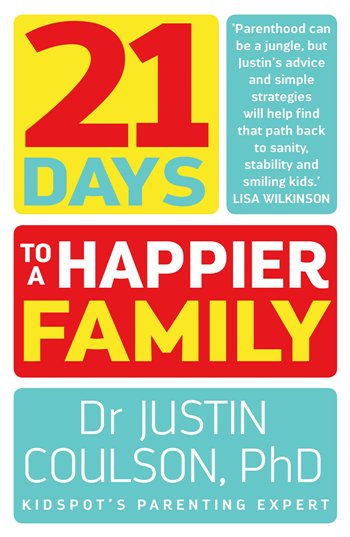
Dr Justin Coulson is a regular contributor to the popular parenting website, Kidspot, and is regularly interviewed on the Christian radio station 103.2 for his tips on parenting toddlers to teenagers.
His latest book, 21 Days to a Happier Family, is for parents who are looking for help with their children and family life.
One thing I have always liked about Dr Coulson’s approach is that he has ample opportunity to practise it himself. He and his wife Kylie have six children.
It was his struggles as a young father to a toddler that led him to further study in the first place. He now passes on what he has learnt to others.
His approach is less about handing on parenting tips and techniques, and more about equipping readers with insights from positive psychology and other psychological research to help them identify and develop habits that will strengthen their own families.
It is very wholistic, and very Christian.
He advocates for autonomy-supportive parenting, which to some people can sound a lot like letting kids get away with whatever they like. It is different, though.
It puts the onus on the parents to make sure they try to understand, when there is a problem, what their child is feeling or where their child is coming from, and work with their child to find an appropriate solution.
Dr Coulson points out how this easily trumps both the passive or laissez-faire parenting style, and controlling or authoritarian approach, which, at their extremes, are clearly harmful to children.
But he departs from many parenting experts in that he also thinks it superior to authoritative parenting, in which parents often express warmth and love but, he argues, are still often coercive.
“We do have to control some things,” he says.
“But where choice is viable, we offer it in an autonomously supportive way, clearly presenting our preferences and listening to our child’s, before problem-solving together.”
An example he gives is of three-year-old children who are unco-operative at bedtime. The parents might set the bed time, but children can be given a choice of who will put them too bed. Things needing parental control should be kept to a minimum and include things like drinking age limits, technology limits, and wearing a car seat belt.
Otherwise most solutions can be worked out with the children in a way that everyone in the family can be happy and own the decisions.
It might appear to be a new trend but I think St John Bosco would have been perfectly comfortable with this approach to parenting.
The saint, who was devoted to the education of delinquent boys (and highly successful at it) preferred to see overwhelming gentleness towards children, and the prevention of problems to any form of corrective discipline, however mild.
Punishment was to be a last resort, and corporal punishment was to be “absolutely avoided” as counter-productive and degrading for both the child and the adult.
The saint described his method as “essentially disposing the pupils to obey not from fear or compulsion, but from persuasion … all force must be excluded, and in its place charity must be the mainspring of action”.
In religious language, what the autonomy-supportive model calls for is ongoing discernment about what a child is capable of doing. It’s characterised by unconditional love, respect and, where appropriate, a collaborative approach to family decision-making.
This approach has lots going for it, Dr Coulson says, including forming children’s resilience, initiative, problem-solving skills, and trust in their parents.
In 21 Days to a Happier Family he uses examples of families he has helped in his practice using strategies outlined in the book.
He recommends not reading the whole book cover to cover, only the sections that look relevant, and then trying out just one or two of the suggested tips or activities.
I read this book around the same time that I read Amoris Laetitia, in which Pope Francis gave tips for a happier marriage and family life.
I enjoyed the parallels.
For example, the pope reiterated his request to parents to “look kindly” at each other and their children, to really notice them and to smile often at the people they live with.
Dr Coulson also thinks that something as simple as a kind look or smile is not just an outcome, but can be a driver of happier family life.
He says there is enough research to support the claim that “smiles improve relationships”, so it’s worth forcing ourselves to do it if we have to.
He also writes of the benefits for maintaining family traditions and creating new ones, establishing routines, setting boundaries, creating peak memories, leading by example, and practising mindfulness.
The title implies it’s setting out a 21-day program, which is not the case. But for the 21 challenges (and numerous additional tips) that have been proposed, it would be fun to take one every two weeks or so and review at the end of the year in which aspects the family became happier.
